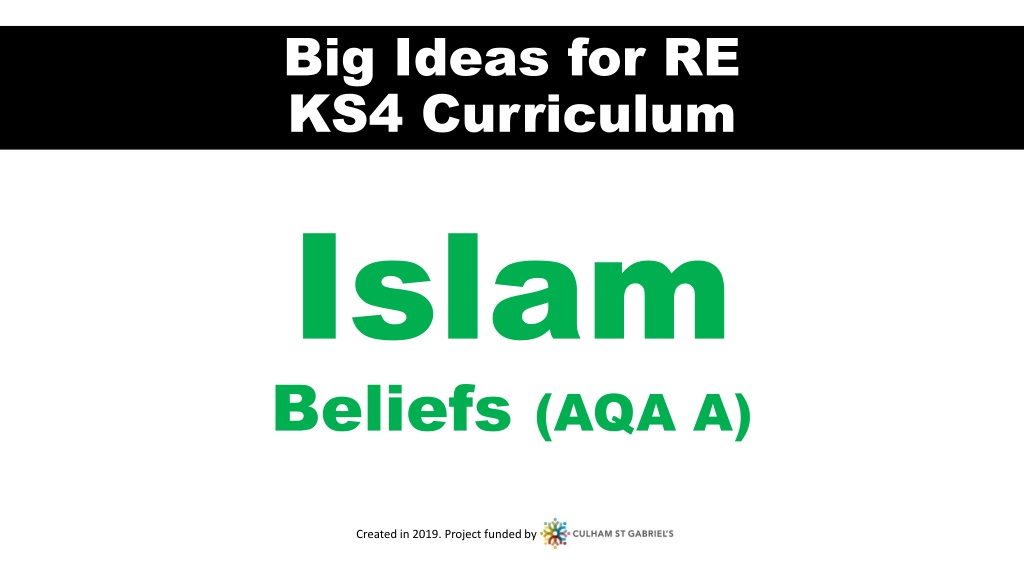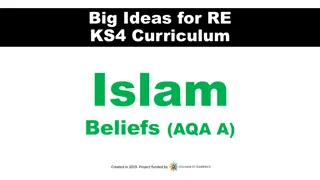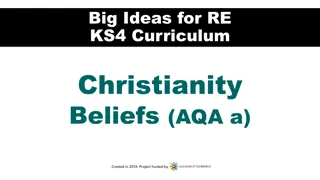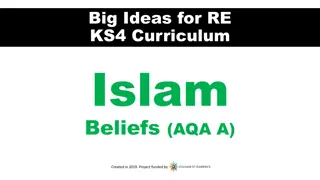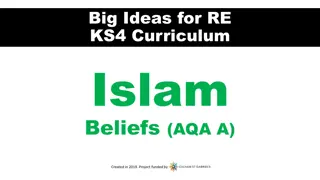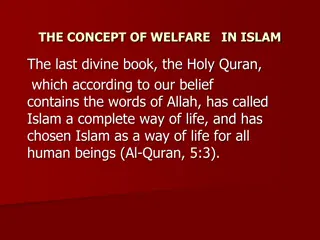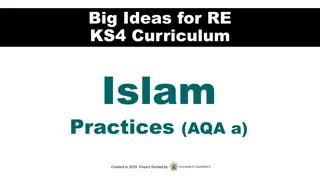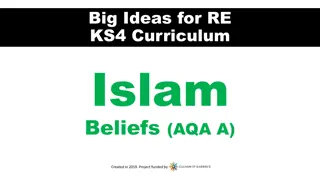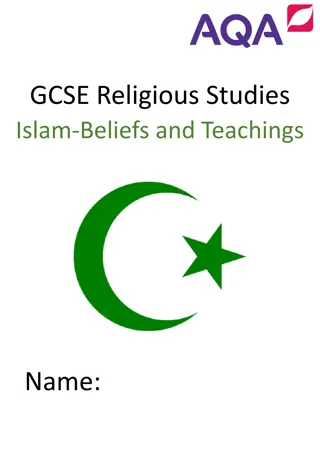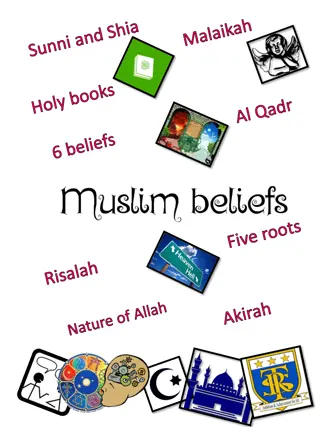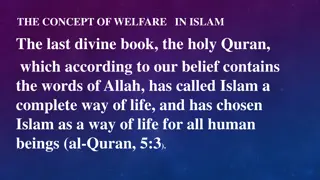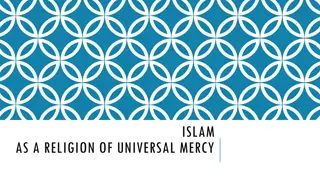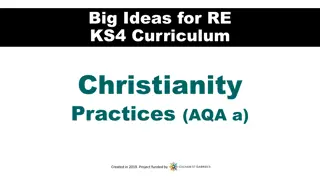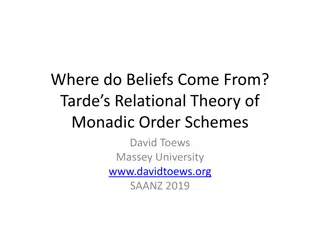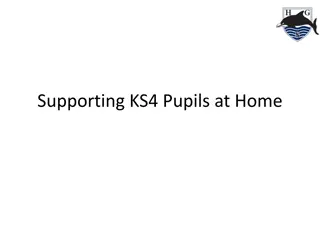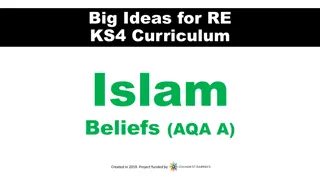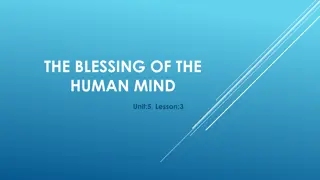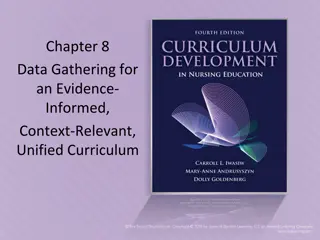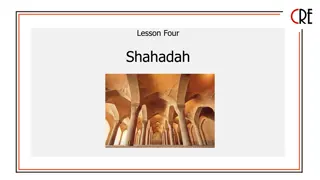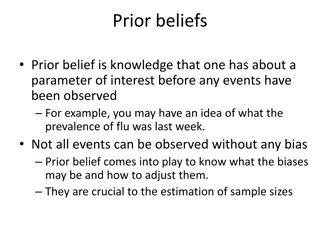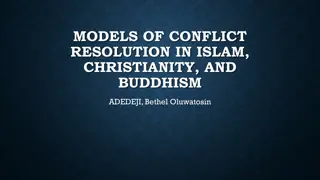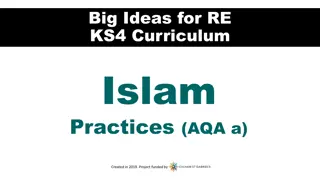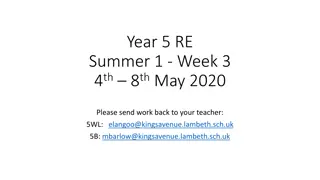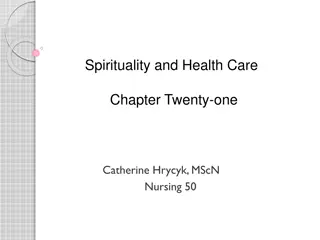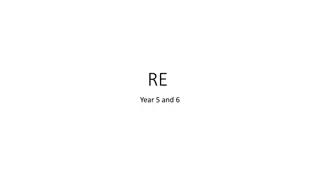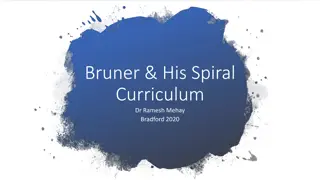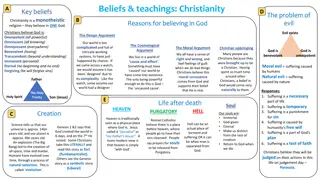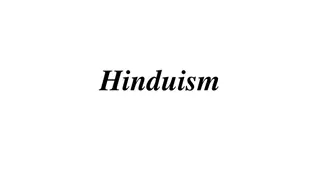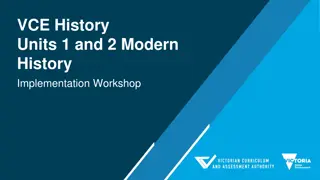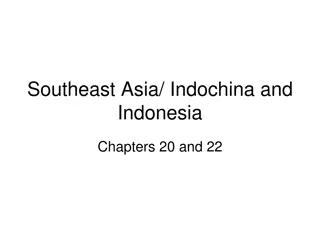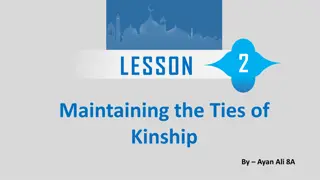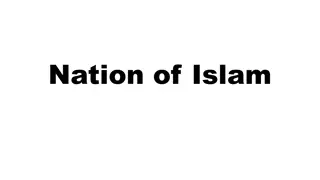Exploring Islam Beliefs in the KS4 Curriculum: Big Ideas and Key Concepts
Delve into the fundamental beliefs of Islam according to the AQA A curriculum, focusing on the authority of Prophethood, key beliefs like Tawhid (Oneness of God), nature of God, angels, predestination, and the afterlife. Explore the significance of holy books like the Qur'an, Torah, Psalms, and Gospel, as well as the roles of prophets such as Adam, Ibrahim, and Muhammad. Engage with educational resources and lesson activities to deepen understanding of Islamic faith concepts and their historical context.
Download Presentation

Please find below an Image/Link to download the presentation.
The content on the website is provided AS IS for your information and personal use only. It may not be sold, licensed, or shared on other websites without obtaining consent from the author. Download presentation by click this link. If you encounter any issues during the download, it is possible that the publisher has removed the file from their server.
E N D
Presentation Transcript
Big Ideas for RE KS4 Curriculum Islam Beliefs (AQA A) Created in 2019. Project funded by
AQA a: ISLAM, BELIEFS AQA a: ISLAM, BELIEFS Authority Prophethood (Risalah) including the role and importance of Adam, Ibrahim and Muhammad. The holy books: Qur an: revelation and authority The Torah, the Psalms, the Gospel, the Scrolls of Abraham and their authority. The imamate in Shi a Islam: its role and significance. Key Beliefs The six articles of faith in Sunni Islam and five roots of Usul ad-Din in Shi a Islam, including key similarities and differences. The Oneness of God (Tawhid), Qur an Surah 112. The nature of God: omnipotence, beneficence, mercy, fairness and justice (Adalat in Shi a Islam), including different ideas about God s relationship with the world: immanence and transcendence. Angels, their nature and role, including Jibril and Mika il. Predestination and human freedom and its relationship to the Day of Judgement. Life after death (Akhirah), human responsibility and accountability, resurrection, heaven and hell.
2: 2: Before Islam (b) books Before Islam (b) books From the spec holy books; revelation and authority; psalms, gospels, scrolls BIG IDEAS LEARNING CONTEXT: timeline: Jewish bible, Christian Bible, Qur an BELIEFS: books as revealed BELIEFS: information about scrolls, zabur and injil Learning outcomes: Idea of revealed books in Islam Wider idea of revelation in the Abrahamic faiths The scrolls of Ibrahim and Musa The zabur of Dawud The injil of Isa RESOURCES 2 Kutub
Lesson 2 Recap role of a prophet, Adam and Ibrahim, prophets before Muhammad. Can the class name any other prophets? Do students know anything about Islamic holy books before the Qur an? Read about the scrolls of Ibrahim and Musa in 2 Kutub sheet. Discuss: is this mythical or historical thinking? recap Dawud and Isa- two prophets in Islam. Can students give their Hebrew names and the books they are believed to have authored? Read about Zabur and Injil on 2 kutub sheet Complete table on slide- Arabic/ Hebrew or English names of books, revealed to which prophet In groups; identify three beliefs about revealed books (kutub) Answer question: why are pre-Islamic books part of Islam?
Do Now: What is a prophet? Which ONE of the following means prophet hood? A)Tawhid B) Risalah C) Adalat D)Kutub Which ONE of the following is a prophet? A) Hawa B) Adam C) Joseph D) Mary Explain the role of prophets in Islam?
WE: Read the fact file Discuss: Is this mythical or historical thinking? TASK: Complete the table identify the names given to the revealed scriptures (kutub) and to which prophets they were revealed too.
Revealed Books in Islam ENGLISH/ HEBREW NAME ARABIC NAME REVEALED TO.. WE: Complete the sheet using the info file
Surah 87:11 Isa Musa Surah 5: 43 He that fears Allah will heed it (the warnings of the scrolls), but the wicked sinner will flout it. All this is written in earlier scriptures; the scriptures of Ibrahim (and Moses). But how will they come to you for judgement when they already have the Tawrat which enshrines Allah s own judgement? Soon after, they will turn their backs: they are no true believers. Ibrahim Dawud Surah 5: 46 A lost Holy book A distorted Holy book. After them We sent forth Isa son of Maryam, confirming the Tawrat already revealed, and gave him the Injil, in which there is guidance and light Sura 4 : 163 We have revealed it to Noah and to the prophets who came after him; as We revealed it to Ibrahim . . .and Dawud, to whom We gave the Psalms. A distorted Holy book. Considered the most distorted of all.. The Arabic word for the original revelation to Isa, is Injil. Literally this means Good News . Islam teaches that Allah sent his message to Isa, but the revelation was replaced with false teachings. Muslims believe that when Allah saw how distorted the Injil had become (especially in saying that Isa was Allah s son shirk) he decided to send the revelation in such a way that it could never be distorted again. According to Islam, this is why Allah chose to give Muhammad the Qur an by dictation, meaning that the revelation could not be distorted in such a grave way again. This holy book or scroll is not believed to have survived today. It is claimed by Muslim scholars that the scrolls were given to Ibrahim, and recorded by him and his scribes. However over time this revelation was lost, and as a result Allah had to send another holy book via a new prophet. According to the Qur an, these scrolls were about obedience to Allah. This holy book was given by Allah to Musa. It literally translates as instructions and refers to the revelation of the Jewish Torah or Christian Pentateuch, (the first five books of the Bible). Muslims believe the instructions were the same given by Allah to all prophets including Ibrahim and Dawud. Musa s revelation is said to have been rejected by some of the people at the time of Musa, which is why a new revelation was needed. According to the Qur an the Zabur was revealed to King Dawud of Israel. Muslim scholars equate this to the Pslams found in the Bible. It literally translates as song or music . It is mentioned by name only 3 times in the Qur an. Muslims believe part of this revelation includes My servants the righteous, shall inherit the earth .
YOU: Independent Task Identify three beliefs about revealed books (kutub)? Why are pre-Islamic books part of Islam? PEQ: Explain the different ideas held about Tawrat? (5 marks)
Exit ticket: What is a prophet? Name two prophets? What are the kutub? Name the pre-Islamic scriptures? What does the word Qur an mean? Why does the Qur an have more authority than any other holy books in Islam? This is the Scripture in which there is no doubt, containing guidance for those who are mindful of God. Qur an 2:2
